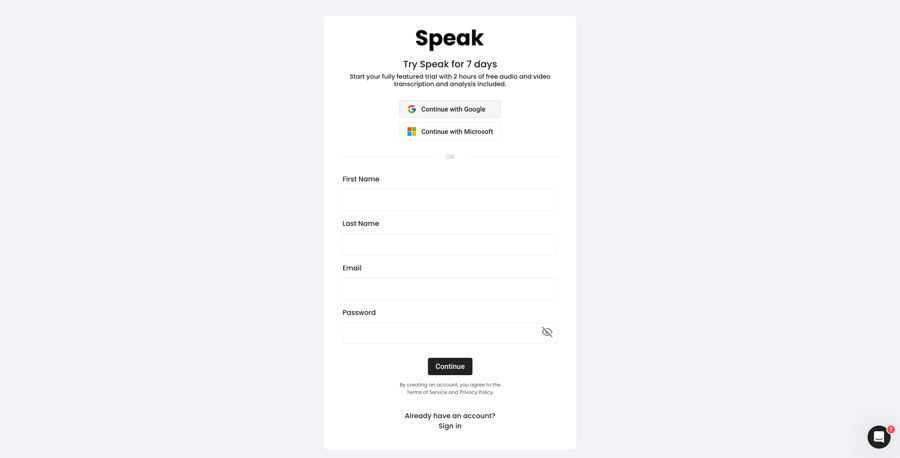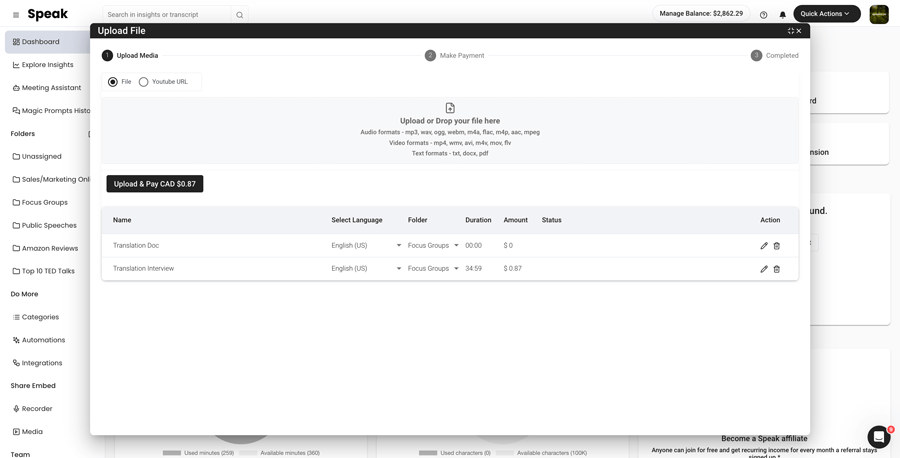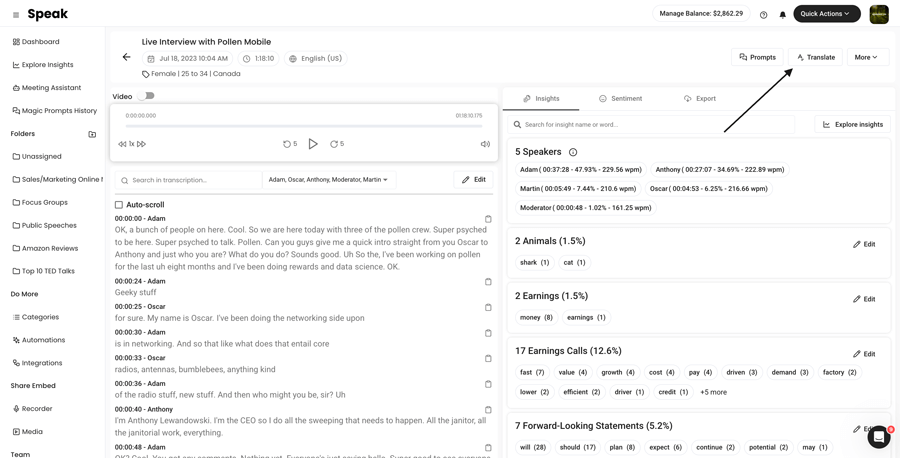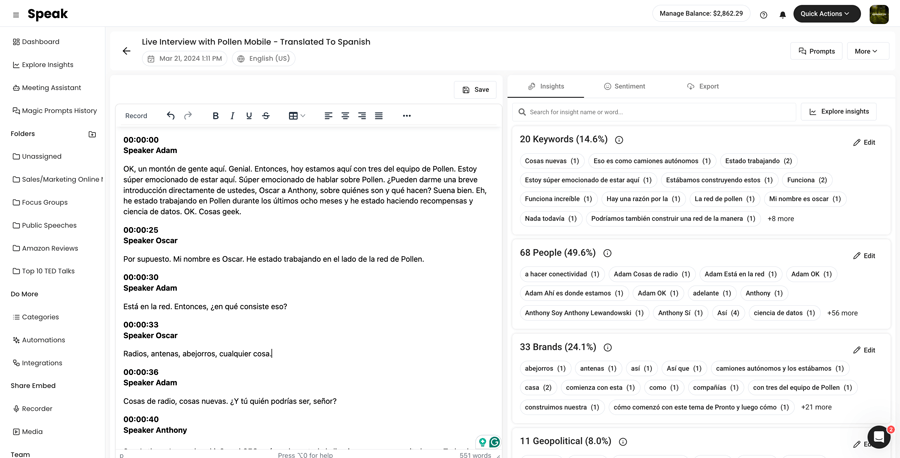How To Translate Japanese to Aymara
Translating Japanese to Aymara is super simple!

Step 1: Register for Speak
Register for Speak using this link.
Once you register, you can instantly begin translating your Japanese to Aymara file(s).

Step 2: Upload Your Japanese file(s)
As soon as you log in, you will be redirected to the dashboard.
Once there, you can select the Quick Action "New Upload".
In Speak, you can seamlessly upload, transcribe and translate audio, video and text files all at once!

Step 3: Translate Your Japanese file(s) to Aymara
Once the file is uploaded, simply visit your file and select "Translate".
If it is an audio and video file, Speak will ask you if you want to keep the speaker names and timestamps in the translation.
Want to translate many files at once? No problem!
You can view the files you want to automatically translate from Japanese to Aymara from the folder level and instantly translate as many files as you need with our artificial intelligence translation in just a few clicks.

Step 4: That's It! View, Analyze, Modify & Export Your New Aymara file(s)
Once the translation is done, you will be alerted and you will see a new document in the same folder your original file is in.
The file will be named the same but with a dash indicating that it is the translated version.
Need support with your Japanese translation?
We are always here and happy to help at Speak!
Just send us a message on live chat on the bottom right corner and we will ensure you are set up for success.
Interested in translating Japanese or other languages to different languages? View our entire list of supported translation languages here.
Automatic, accurate, instant AI translation from Japanese to Aymara is here for you.
Register for Speak using this link and begin translating Japanese to Aymara today.
Unlocking New Opportunities: Translate Japanese to Aymara with AI Technology
As the world becomes increasingly interconnected, the demand for seamless communication across diverse languages has never been more critical. In this pursuit, the cutting-edge solution of translating Japanese to Aymara via AI technology stands out, bridging two rich cultures separated by vast distances. Speak AI, leveraging its prowess in Natural Language Processing (NLP) and generative AI, is at the forefront of making this groundbreaking communication possible. Through our software, businesses and researchers can unlock new opportunities, fostering connections and understanding between Japanese and Aymara speakers.
Why Translate Japanese to Aymara?
The intersection of Japanese and Aymara cultures represents a unique blend of traditions, histories, and languages. By translating Japanese to Aymara, individuals and organizations can explore new realms of knowledge, tap into untapped markets, and contribute to the preservation and revitalization of the Aymara language, one of the oldest still spoken on the South American continent.
Relevant Use Cases
- Academic Research: Facilitate cross-cultural studies and collaboration between Japanese and South American researchers focusing on linguistics, anthropology, and history.
- Business Expansion: Enable Japanese companies to extend their products and services to Aymara-speaking regions, fostering economic growth and diversity.
- Cultural Exchange: Promote cultural awareness and appreciation by translating literature, folklore, and traditional knowledge.
Benefits of AI Translation
- Time and Cost Efficiency: Automatic translation drastically reduces the time and expense involved in manual translation processes.
- Accuracy and Consistency: AI algorithms continually learn and adapt, ensuring high translation accuracy and uniformity across large volumes of content.
- Scalability: Speak AI’s technology can handle vast amounts of data, supporting businesses and researchers as their translation needs grow.
Integral Features of Speak AI for Japanese to Aymara Translation
AI Meeting Assistant
Speak AI’s AI Meeting Assistant revolutionizes how multilingual meetings are conducted. It can join meetings on platforms like Microsoft Teams, Zoom, Google Meet, and Webex, automatically transcribing and translating discussions from Japanese to Aymara and vice versa. This facilitates real-time understanding and collaboration across language barriers.
Automatic Analysis and Visualization
Our software doesn’t just translate; it analyzes the content to provide insights on sentiment, keywords, and trends. This feature is invaluable for researchers and businesses aiming to understand the nuances and impacts of their cross-linguistic communications.
User-Friendly Interface
With a focus on accessibility, Speak AI offers a streamlined, intuitive interface that makes translating audio, video, and text from Japanese to Aymara seamless and hassle-free.
Diving into the Cultures: Japanese and Aymara
Japanese and Aymara are languages steeped in history, each reflecting the distinct cultures of their people. By exploring these languages, one gains insight into the societies they represent and the importance of fostering connections between them.
Locations and Statistics
Japanese is primarily spoken in Japan, home to over 126 million people, while Aymara is mainly spoken in the Andean regions of Bolivia, Peru, and Chile, with an estimated 1-2 million speakers. Despite their geographical distance, both languages serve as vital communication tools within their respective cultures.
Fascinating Language Facts
Japanese is known for its complex system of honorifics, reflecting the societal emphasis on hierarchy and respect. Aymara, on the other hand, has a rare feature known as "evidentiality," indicating how the speaker came to know the information conveyed.
Differences and Similarities
While Japanese and Aymara differ significantly in grammar, syntax, and phonology, they share a profound respect for tradition and the spoken word’s power. Both languages have evolved to meet the challenges of modernity while preserving their unique heritages, reflecting the resilience and adaptability of their speakers.
Conclusion: The Future is Multilingual
Translating Japanese to Aymara is not just about overcoming language barriers; it's about building bridges between cultures, fostering mutual understanding, and opening up new avenues for collaboration and innovation. Speak AI is proud to be at the forefront of this exciting journey, providing the tools and technology to make these connections possible. With our AI-driven platform, the potential for discovery, growth, and unity is endless. Embrace the future of communication with Speak AI’s translation services, where every word counts, and every language connects.
---
FAQs
What locations are Japanese and Aymara popular?
Japanese is predominantly spoken in Japan, which has a population of over 126 million people. Aymara is primarily spoken in the Andean regions, including Bolivia, Peru, and Chile, with an estimated speaker base of 1-2 million people.
What are some fun facts about Japanese and Aymara?
Japanese is notable for its complex honorific system and its extensive use of borrowed words, especially from English. Aymara is one of the few languages in the world to feature evidentiality, a grammatical indication of the source of the speaker’s information.
What are the differences and similarities between Japanese and Aymara?
The most significant differences lie in their grammatical structures and phonologies, with Japanese featuring a complex system of verb forms and Aymara having a distinct set of phonetic sounds. However, both languages carry the weight of their cultures’ histories, values, and traditions, symbolizing the richness of human diversity and the importance of cross-cultural communication.
Translate Japanese To These Other Supported Languages:
- Translate Japanese-to-Afrikaans
- Translate Japanese-to-Albanian
- Translate Japanese-to-Amharic
- Translate Japanese-to-Arabic (Egypt)
- Translate Japanese-to-Arabic (Iraq)
- Translate Japanese-to-Arabic (Israel)
- Translate Japanese-to-Arabic (Jordan)
- Translate Japanese-to-Arabic (Kuwait)
- Translate Japanese-to-Arabic (Lebanon)
- Translate Japanese-to-Arabic (Oman)
- Translate Japanese-to-Arabic (Palestinian Authority)
- Translate Japanese-to-Arabic (Qatar)
- Translate Japanese-to-Arabic (Saudi Arabia)
- Translate Japanese-to-Arabic (Syrian Arab Republic)
- Translate Japanese-to-Arabic (United Arab Emirates)
- Translate Japanese-to-Arabic Modern Standard (Bahrain)
- Translate Japanese-to-Armenian
- Translate Japanese-to-Assamese
- Translate Japanese-to-Aymara
- Translate Japanese-to-Azerbaijani
- Translate Japanese-to-Bambara
- Translate Japanese-to-Basque
- Translate Japanese-to-Belarusian
- Translate Japanese-to-Bengali
- Translate Japanese-to-Bhojpuri
- Translate Japanese-to-Bosnian
- Translate Japanese-to-Bulgarian
- Translate Japanese-to-Catalan
- Translate Japanese-to-Cebuano
- Translate Japanese-to-Chinese (Simplified)
- Translate Japanese-to-Chinese (Traditional)
- Translate Japanese-to-Corsican
- Translate Japanese-to-Croatian
- Translate Japanese-to-Czech
- Translate Japanese-to-Danish
- Translate Japanese-to-Dari
- Translate Japanese-to-Dhivehi
- Translate Japanese-to-Dogri
- Translate Japanese-to-Dutch
- Translate Japanese-to-English
- Translate Japanese-to-English (Australia)
- Translate Japanese-to-English (Indian)
- Translate Japanese-to-English (Irish)
- Translate Japanese-to-English (New Zealand)
- Translate Japanese-to-English (Scottish)
- Translate Japanese-to-English (South African)
- Translate Japanese-to-English (United Kingdom)
- Translate Japanese-to-English (United States)
- Translate Japanese-to-Esperanto
- Translate Japanese-to-Estonian
- Translate Japanese-to-Ewe
- Translate Japanese-to-Farsi (Persian)
- Translate Japanese-to-Filipino Tagalog
- Translate Japanese-to-Finnish
- Translate Japanese-to-French
- Translate Japanese-to-French (Canada)
- Translate Japanese-to-Frisian
- Translate Japanese-to-Galician
- Translate Japanese-to-Georgian
- Translate Japanese-to-German
- Translate Japanese-to-German (Swiss)
- Translate Japanese-to-Greek
- Translate Japanese-to-Guarani
- Translate Japanese-to-Gujarati
- Translate Japanese-to-Haitian Creole
- Translate Japanese-to-Hausa
- Translate Japanese-to-Hawaiian
- Translate Japanese-to-Hebrew
- Translate Japanese-to-Hindi
- Translate Japanese-to-Hmong
- Translate Japanese-to-Hungarian
- Translate Japanese-to-Icelandic
- Translate Japanese-to-Igbo
- Translate Japanese-to-Ilocano
- Translate Japanese-to-Indonesian
- Translate Japanese-to-Irish
- Translate Japanese-to-Italian
- Translate Japanese-to-Japanese
- Translate Japanese-to-Javanese
- Translate Japanese-to-Kannada
- Translate Japanese-to-Kazakh
- Translate Japanese-to-Khmer
- Translate Japanese-to-Kinyarwanda
- Translate Japanese-to-Konkani
- Translate Japanese-to-Korean
- Translate Japanese-to-Krio
- Translate Japanese-to-Kurdish
- Translate Japanese-to-Kurdish (Sorani)
- Translate Japanese-to-Kyrgyz
- Translate Japanese-to-Lao
- Translate Japanese-to-Latin
- Translate Japanese-to-Latvian
- Translate Japanese-to-Lingala
- Translate Japanese-to-Lithuanian
- Translate Japanese-to-Luganda
- Translate Japanese-to-Luxembourgish
- Translate Japanese-to-Macedonian
- Translate Japanese-to-Maithili
- Translate Japanese-to-Malagasy
- Translate Japanese-to-Malay
- Translate Japanese-to-Malayalam
- Translate Japanese-to-Maltese
- Translate Japanese-to-Maori
- Translate Japanese-to-Marathi
- Translate Japanese-to-Meiteilon (Manipuri)
- Translate Japanese-to-Mizo
- Translate Japanese-to-Mongolian
- Translate Japanese-to-Myanmar (Burmese)
- Translate Japanese-to-Nepali
- Translate Japanese-to-Norwegian
- Translate Japanese-to-Nyanja (Chichewa)
- Translate Japanese-to-Odia (Oriya)
- Translate Japanese-to-Oromo
- Translate Japanese-to-Pashto
- Translate Japanese-to-Persian
- Translate Japanese-to-Polish
- Translate Japanese-to-Portuguese
- Translate Japanese-to-Portuguese (Brazilian)
- Translate Japanese-to-Portuguese (Portugal)
- Translate Japanese-to-Punjabi
- Translate Japanese-to-Quechua
- Translate Japanese-to-Romanian
- Translate Japanese-to-Russian
- Translate Japanese-to-Samoan
- Translate Japanese-to-Sanskrit
- Translate Japanese-to-Scots Gaelic
- Translate Japanese-to-Sepedi
- Translate Japanese-to-Serbian
- Translate Japanese-to-Sesotho
- Translate Japanese-to-Shona
- Translate Japanese-to-Sindhi
- Translate Japanese-to-Sinhala
- Translate Japanese-to-Sinhala (Sinhalese)
- Translate Japanese-to-Slovak
- Translate Japanese-to-Slovenian
- Translate Japanese-to-Somali
- Translate Japanese-to-Spanish
- Translate Japanese-to-Spanish (Mexico)
- Translate Japanese-to-Sundanese
- Translate Japanese-to-Swahili
- Translate Japanese-to-Swedish
- Translate Japanese-to-Tajik
- Translate Japanese-to-Tamil
- Translate Japanese-to-Tatar
- Translate Japanese-to-Telugu
- Translate Japanese-to-Thai
- Translate Japanese-to-Tigrinya
- Translate Japanese-to-Tsonga
- Translate Japanese-to-Turkish
- Translate Japanese-to-Turkmen
- Translate Japanese-to-Twi (Akan)
- Translate Japanese-to-Ukrainian
- Translate Japanese-to-Urdu
- Translate Japanese-to-Uyghur
- Translate Japanese-to-Uzbek
- Translate Japanese-to-Vietnamese
- Translate Japanese-to-Welsh
- Translate Japanese-to-Xhosa
- Translate Japanese-to-Yiddish
- Translate Japanese-to-Yoruba
- Translate Japanese-to-Zulu



